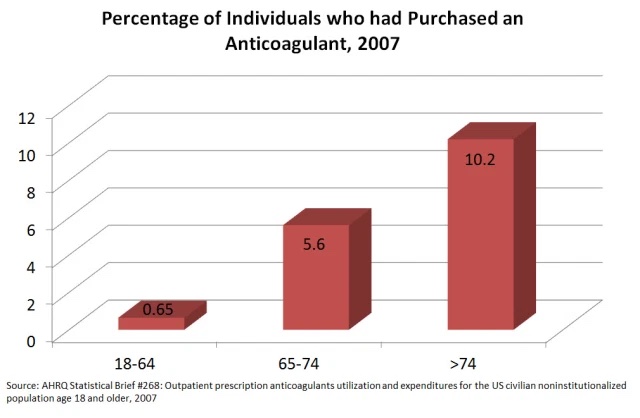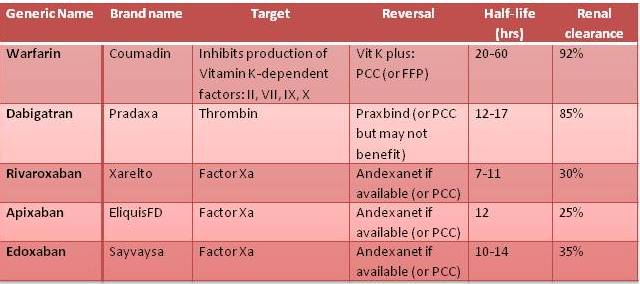How to Reverse Oral Anticoagulants
With Leah Hatfield
The number of new oral anticoagulants has grown dramatically in the last few years. And with that growth has come the need for new reversal agents. Reversing anticoagulation in patients with acute intra-cranial hemorrhages can be complex and dependent on what medication your hospital stores. It is important to know what is out there, what you can use, and how effective it is likely to be.
Anticoagulation use is certainly not unique to older adults, but is much more common because of the higher prevalence of a-fib and the concurrently higher CHADS-VASC score, as well as higher rates of valvular disease and venous thromboembolism. Older adults are also at higher risk of intra-cranial hemorrhage even without anticoagulation. Putting the risks of age and the higher rates of anti-coagulation use makes anticoagulation reversal an important topic for the care of older patients.

In this episode Leah Hatfield, an ED pharmacist, and I discuss a hypothetical 70 year old female on a range of different anticoagulants who presents with a traumatic intra-parenchymal hemorrhage after a fall from standing.
Summary of Recommendations
For the thrombin inhibitors, Praxbind would be first line, and PCC may be tried, but may not be of benefit. However, PCC is effective in reversing the anticoagulant effect of the Xa inhibitor Rivaroxaban (see Eerenberg article listed below). It is important to note, however, that the study listed was on anticoagulant effect, not on patient outcomes. Most institutions will have an agreed-upon anticoagulation reversal protocol that incorporates the availability of the below items at your site. Second line agents in parentheses. This is presuming FDA approval of andexanet alpha occurs shortly!

References
- Barnes GD, Kurtz B. Direct oral anticoagulants: Unique properties and practical approaches to management. Heart. 2016;102(20):1620-1626. https://www.ncbi.nlm.nih.gov/pubmed/27402803
- Tummala R, Kavtaradze A, Gupta A, Ghosh RK. Specific antidotes against direct oral anticoagulants: A comprehensive review of clinical trials data. Int J Cardiol. 2016;214:292-298. https://www.ncbi.nlm.nih.gov/pubmed/27082776
- Rogers KC, Shelton MP, Finks S. Reversal agents for direct oral anticoagulants: Understanding new and upcoming options. Cardiol Rev. 2016. https://www.ncbi.nlm.nih.gov/pubmed/27548686
- Christos S, Naples R. Anticoagulation reversal and treatment strategies in major bleeding: Update 2016. West J Emerg Med. 2016;17(3):264-270. https://www.ncbi.nlm.nih.gov/pubmed/27330657
- Jaben EA, Mulay SB, Stubbs JR. Reversing the effects of antiplatelet agents in the setting of intracranial hemorrhage: A look at the literature. J Intensive Care Med. 2015;30(1):3-7. https://www.ncbi.nlm.nih.gov/pubmed/25492811
- Reddy S, Sharma R, Grotts J, Ferrigno L, Kaminski S. Incidence of intracranial hemorrhage and outcomes after ground-level falls in geriatric trauma patients taking preinjury anticoagulants and antiplatelet agents. Am Surg. 2014;80(10):975-978. https://www.ncbi.nlm.nih.gov/pubmed/25264642
- Nishijima DK, Offerman SR, Ballard DW, et al. Immediate and delayed traumatic intracranial hemorrhage in patients with head trauma and preinjury warfarin or clopidogrel use. Ann Emerg Med. 2012;59(6):460-8.e1-7. https://www.ncbi.nlm.nih.gov/pubmed/22626015
- Edavettal M, Rogers A, Rogers F, Horst M, Leng W. Prothrombin complex concentrate accelerates international normalized ratio reversal and diminishes the extension of intracranial hemorrhage in geriatric trauma patients. Am Surg. 2014;80(4):372-376. https://www.ncbi.nlm.nih.gov/pubmed/24887668
- Baharoglu MI, Cordonnier C, Al-Shahi Salman R, et al. Platelet transfusion versus standard care after acute stroke due to spontaneous cerebral haemorrhage associated with antiplatelet therapy (PATCH): A randomised, open-label, phase 3 trial. Lancet. 2016;387(10038):2605-2613. https://www.ncbi.nlm.nih.gov/pubmed/27178479
- Eerenberg ES, Kamphuisen PW, Sijpkens MK, Meijers JC, Buller HR, Levi M ..Reversal of rivaroxaban and dabigatran by prothrombin complex concentrate: a randomized, placebo-controlled, crossover study in healthy subjects. Circulation 2011; 124(14) https://www.ncbi.nlm.nih.gov/pubmed/21900088
Image credit [brain image].
This podcast uses sounds from freesound.org by Jobro and HerbertBoland
This entry was posted in Medications and Adverse Drug Events, Neurology and Psychiatry, Trauma. Bookmark the permalink.
Hosted by
Dr. Christina Shenvi is an associate professor of Emergency Medicine at the University of North Carolina. She is fellowship-trained in Geriatric Emergency Medicine and is the founder of GEMCast. She is the director of the UNC Office of Academic Excellence, president of the Association of Professional Women in Medical Sciences, co-directs the ACEP/CORD Teaching Fellowship, is on the Annals of EM editorial board, is on the Geriatric ED Accreditation board of governors, and she teaches and writes about time management at timeforyourlife.org.